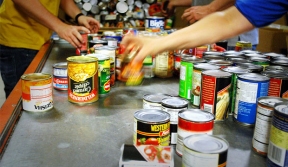
The idea is simple: Load fresh fruits and vegetables into a refrigerator truck and drive it to a health clinic, then have a doctor write a “prescription” for food to improve the diets of low-income people with diabetes and high blood pressure. U.S. food banks – the organizations on the front lines of fighting hunger – increasingly are promoting “food as medicine” strategies designed to address, not exacerbate, the high rate of chronic health problems among the poor. One-third of households using food banks are feeding a family member with diabetes, and 58 percent have a family member with high blood pressure, according to a recent survey by Feeding America, a national network of 200 food banks. Meanwhile, 55 percent of people identify fresh fruits and vegetables as the foods they most desire but aren’t receiving from their food pantry. “I’m on a very limited income,” said James Cline, who has diabetes and gets by on $700 a month living with his mother in suburban Chicago. Disabled after an all-terrain vehicle accident, the 53-year-old former loading dock worker knows he should eat more fresh produce. But the cost of a nutritious diet can be out of reach, so he took his doctor’s advice and showed up for a recent produce giveaway at Oak Forest Health Center.

“It helps a lot,” he said. Since August 2015, six Chicago-area clinics have hosted 26 “Fresh Truck” visits by the Greater Chicago Food Depository, providing more than 100,000 pounds of fresh fruit and vegetables to more than 3,200 households. Nationally, 30 food banks are working directly with health care providers to identify low-income patients who sometimes run out of food. In Idaho, doctors in Boise and Caldwell plan to add small food pantries to their offices. In Delaware, pediatricians write “prescriptions” for fresh produce; a family can get up to 25 pounds each month distributed by the local food bank at clinics. “Food banks are trying to do better by providing fewer starches and carbs and more lean proteins, fruits, vegetables and whole grains,” said Dr. Hilary Seligman, senior medical adviser for Feeding America. “The nutritious foods that are expensive for our clients are also expensive for food banks. We’re figuring out how we can do this and do it better.”










